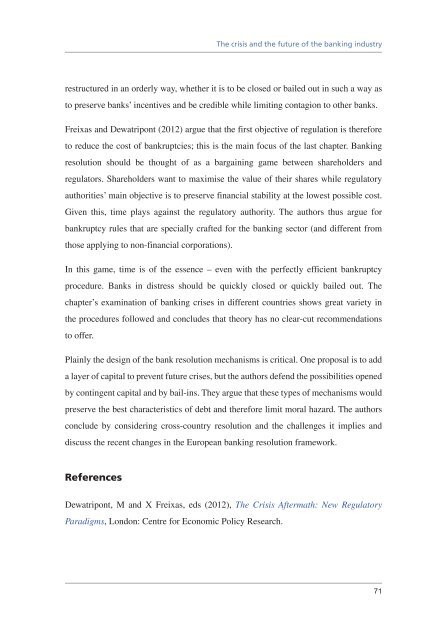Download PDF - Vox
Download PDF - Vox
Download PDF - Vox
- No tags were found...
Create successful ePaper yourself
Turn your PDF publications into a flip-book with our unique Google optimized e-Paper software.
The crisis and the future of the banking industryrestructured in an orderly way, whether it is to be closed or bailed out in such a way asto preserve banks’ incentives and be credible while limiting contagion to other banks.Freixas and Dewatripont (2012) argue that the first objective of regulation is thereforeto reduce the cost of bankruptcies; this is the main focus of the last chapter. Bankingresolution should be thought of as a bargaining game between shareholders andregulators. Shareholders want to maximise the value of their shares while regulatoryauthorities’ main objective is to preserve financial stability at the lowest possible cost.Given this, time plays against the regulatory authority. The authors thus argue forbankruptcy rules that are specially crafted for the banking sector (and different fromthose applying to non-financial corporations).In this game, time is of the essence – even with the perfectly efficient bankruptcyprocedure. Banks in distress should be quickly closed or quickly bailed out. Thechapter’s examination of banking crises in different countries shows great variety inthe procedures followed and concludes that theory has no clear-cut recommendationsto offer.Plainly the design of the bank resolution mechanisms is critical. One proposal is to adda layer of capital to prevent future crises, but the authors defend the possibilities openedby contingent capital and by bail-ins. They argue that these types of mechanisms wouldpreserve the best characteristics of debt and therefore limit moral hazard. The authorsconclude by considering cross-country resolution and the challenges it implies anddiscuss the recent changes in the European banking resolution framework.ReferencesDewatripont, M and X Freixas, eds (2012), The Crisis Aftermath: New RegulatoryParadigms, London: Centre for Economic Policy Research.71














